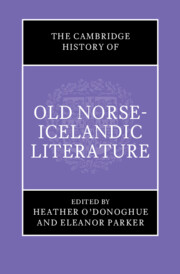Book contents
- The Cambridge History of Old Norse-Icelandic Literature
- The Cambridge History of Old Norse-Icelandic Literature
- Copyright page
- Contents
- Contributors
- Abbreviations
- Introduction
- Part I Contexts
- Part II The Distant Past
- 7 Mythological Poetry
- 8 Heroic Poetry
- 9 Fornaldarsögur
- Part III The Saga Age
- Part IV The New Christian World
- PART V Beyond Iceland
- Part VI Compilations
- Glossary
- Bibliography
- Index
9 - Fornaldarsögur
from Part II - The Distant Past
Published online by Cambridge University Press: 08 February 2024
- The Cambridge History of Old Norse-Icelandic Literature
- The Cambridge History of Old Norse-Icelandic Literature
- Copyright page
- Contents
- Contributors
- Abbreviations
- Introduction
- Part I Contexts
- Part II The Distant Past
- 7 Mythological Poetry
- 8 Heroic Poetry
- 9 Fornaldarsögur
- Part III The Saga Age
- Part IV The New Christian World
- PART V Beyond Iceland
- Part VI Compilations
- Glossary
- Bibliography
- Index
Summary
This chapter deals with the fornaldarsögur (sagas of olden times), defined as legendary sagas about events in Nordic countries before the settlement of Iceland. It sets out the evidence of their popularity and describes the extent of their geographical settings. After noting their stylistic similarities to Íslendingasögur, the discussion moves on to place them within the larger European and heroic tradition, outlining the material they share with Old English and Middle High German literature and their links to eddic and skaldic verse. The influences of French courtly literature, religious literature and classical sources are explored. The folkloric dimension of the fornaldarsögur is pointed out, and the possibility of classifying the sagas as generic hybrids is suggested. Next the transmission of fornaldarsögur is discussed, followed by a reassessment of how the corpus might be divided into subgroups. The chapter then discusses possible composition dates and provides an analysis of the emergence of the genre, including the influence of Saxo’s Gesta Danorum. It ends with a discussion of fantastical narrative elements, which led to the label lygisögur (‘lying sagas’).
Keywords
- Type
- Chapter
- Information
- The Cambridge History of Old Norse-Icelandic Literature , pp. 184 - 206Publisher: Cambridge University PressPrint publication year: 2024

